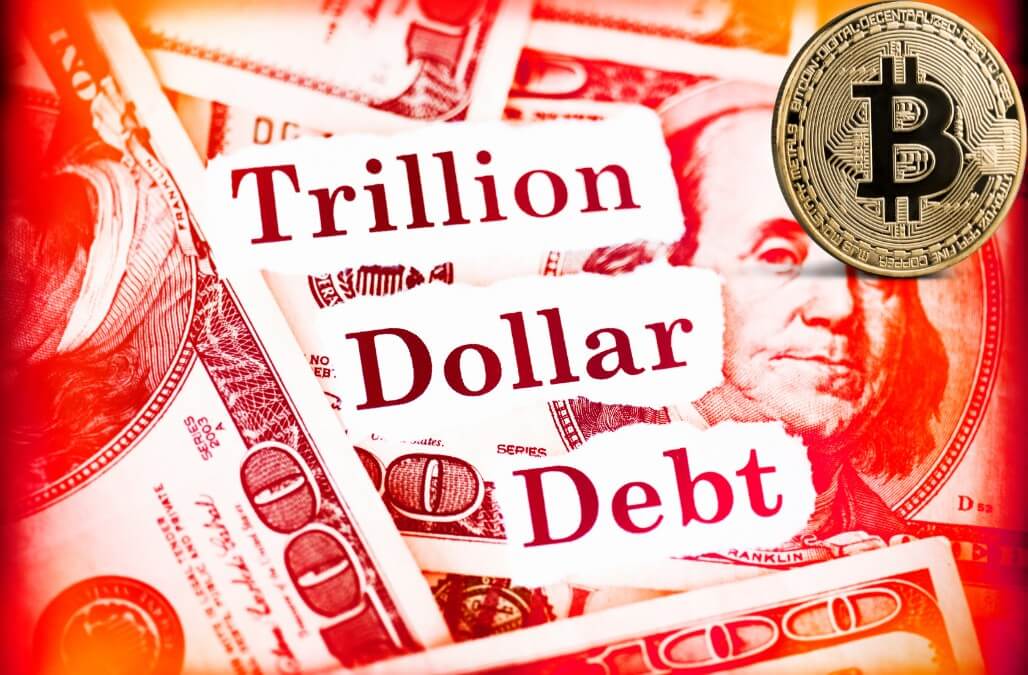This year, Bitcoin and other cryptocurrencies have faced challenges amid increasing pressure from the Federal Reserve on financial markets. With the U.S. national debt skyrocketing to an astounding $33 trillion, concerns are mounting that the United States might be caught in a debt downward spiral, setting off a self-reinforcing cycle that the Federal Reserve might find difficult to break free from.
While the impasse in negotiations to raise the U.S. government’s debt ceiling has left markets on edge, some analysts diverge from the consensus, cautioning that a potential resolution may bring about positive consequences for the crypto market. It’s worth noting that the U.S. national debt now exceeds the total market capitalization of cryptocurrencies, which stands at $1.12 trillion, by a staggering factor of about 30. That would mean that the government would need all the money in about 30 crypto markets to settle its debts.
US Debt is Adding Pressure to the Markets
Recently, the U.S. national debt, which represents the money borrowed by the federal government for operational expenses, reached an unprecedented $33 trillion, according to the U.S. Department of the Treasury. The Covid-19 crisis and subsequent lockdowns have greatly accelerated government spending in recent years.
Concurrently, the Federal Reserve has initiated a rapid series of interest rate hikes to rein in rampant inflation, increasing rates at the fastest pace since the period preceding the 2008 global financial crisis. Hence, the Fed is now allocating a larger portion of its budget solely for interest payments on the national debt. Projections indicate that these interest costs will triple from just under $400 billion last year to nearly $1.2 trillion by 2032, necessitating further borrowing to cover the escalated interest expenses.
Bitcoin advocate Max Keiser asserted that raising interest rates won’t quell inflation; it will fuel even higher inflation. He added that the destructive cycle is relentless, and we have entered a dangerous debt spiral, expressing his belief that all assets will devalue to zero compared to bitcoin.
This week, Jamie Dimon, the CEO of the Wall Street powerhouse JPMorgan, cautioned that individuals should brace for a “worst-case” scenario from the Federal Reserve. That came after Fed Chair Jerome Powell recently stated his readiness to continue raising rates to combat inflation.
Arthur Hayes, the former CEO of the crypto exchange BitMex and a renowned Bitcoin trader, predicted earlier this month that the price of Bitcoin could surge if the Fed persists in raising interest rates. Hayes explained that when rates go up, the government pays more interest to the wealthy, who spend more on services, boosting GDP even further. He added that bondholders might seek higher yields in more lucrative “risk assets” such as Bitcoin.
Bitcoin Presents Itself as a Lucrative Alternative
As the U.S. debt accumulates at an alarming pace and central bank policies erode the dollar’s purchasing power, the argument for Bitcoin as an alternative store of value, immune to government interference, gains even greater credibility.
A potential U.S. debt default could set off a chain reaction that might directly impact the value of Bitcoin and other digital currencies. That would occur as confidence in the U.S. dollar wavers, prompting investors to potentially divest from traditional holdings and seek alternative assets to hedge against the fiat economy. Digital currencies are particularly appealing in this context due to their decentralized nature, providing a degree of insulation from the instability experienced by fiat currencies.
On a broader scale, a U.S. debt default could trigger a surge in inflation because Treasury securities would become less appealing and no longer seen as entirely risk-free. This shift would further bolster Bitcoin’s position, as its fixed supply ensures it cannot be devalued by inflationary measures, distinguishing it from fiat currencies.
Many seasoned investors hold the conviction that the increasing institutional interest in Bitcoin, including significant developments like a $500 billion Japanese bank’s establishment of a “Bitcoin Adoption Fund” and BlackRock’s proposal for a spot Bitcoin exchange-traded fund (ETF), coupled with the upcoming reward halving event, could propel the Bitcoin market to unprecedented heights in early 2024.
Despite the temporary resolution of the U.S. debt ceiling, the prevented shutdown and the postponement of default concerns until 2025, the issue of America’s trillion-dollar debt persists, with no immediate solution. While the initial raising of the U.S. debt ceiling might redirect money from alternative assets towards stocks and bonds, this dynamic may not hold in the long run. As economic headwinds, such as potential banking crises and an impending credit crunch, continue to challenge the economy, the long-term bullish case for cryptocurrencies is anticipated to strengthen.
Following a period of consolidation, Bitcoin has today demonstrated positive indicators by reaching its previous swing high amidst market uncertainty. On closer examination of the daily chart, Bitcoin initially appeared to be somewhat stagnant around the $25K mark, offering little clarity on its future trajectory. However, a bullish divergence between the price and the RSI indicator and robust buying activity near the $25K support level generated the necessary momentum. That resulted in a surge, intending to reclaim the 200-day moving average, currently around $28K.





